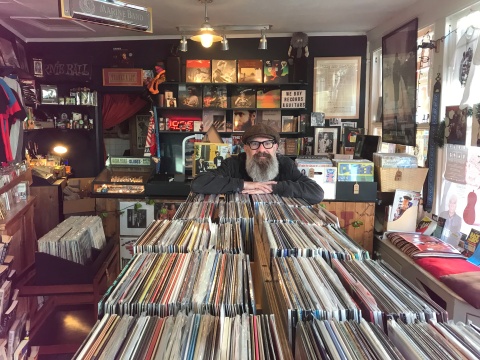Country, Americana and melancholy baritone singer-songwriters loom large in my Top Ten albums of 2013.
The album of the year accolade goes to London-based alt.country act Dead Flowers, for their astonishing debut record Midnight At The Wheel Club.
Recorded late at night, in wintry conditions, it’s a collection of dark, intimate, haunting and confessional songs, inspired by gravel-voiced singer/songwriter Ian Williams’ travels through New York and Montreal.

Set against a backdrop of the spooky, deserted Coney Island funfair, the songs Wonderwheel and The Beach are gorgeous, folk-tinged tunes, while the stunning, piano-led ballad Supernova is the saddest song I’ve heard all year…
Dead Flowers have been compared to Leonard Cohen, Tom Waits, Mark Lanegan, Lee Hazlewood and Lambchop.
When I interviewed Ian earlier this year, he described the album as, ‘like a morbid, little dinner party – if you mess with the seating plan, it will all fall apart’.
The next time I host a dinner party, Midnight At The Wheel Club will be the soundtrack. You can bring the whisky and cigarettes…
Special mentions must also go to country duo My Darling Clementine for their superb second album The Reconciliation?, which saw them adding Southern soul and El Mariachi influences to their sound; Manchester’s Nev Cottee for his debut album Stations (think Lee Hazlewood fronting Spiritualized) ; Richard Warren for Rich Black Earth – raw blues, country and eerie, echo-laden ’50s twangy guitar – and Nick Piunti for his sublime 13 In My Head – an instant power pop classic that’s high on harmonies, hooks and killer choruses.
Here’s the list of my favourite 30 albums of 2013 and a Spotify playlist to go with it.
1) Dead Flowers – Midnight At The Wheel Club
2) Nick Cave & The Bad Seeds – Push The Sky Away
3) My Darling Clementine – The Reconciliation?
4) Nev Cottee– Stations
5) Nick Piunti – 13 In My Head
6) Richard Warren – Rich Black Earth
7) Mark Lanegan – Imitations
8) Jason Isbell – Southeastern
9) Lloyd Cole – Standards
10) Johnny Marr – The Messenger
11) Primal Scream – More Light
12) Manic Street Preachers – Rewind The Film
13) David Bowie – The Next Day
14) Parlour Flames – Parlour Flames
15) Elvis Costello & The Roots – Wise Up Ghost
16) Daughn Gibson – Me Moan
17) Mark Lanegan & Duke Garwood – Black Pudding
18) Marc Carroll – Stone Beads and Silver
19) Ashtray Hearts – The Strangest Light
20) Bill Ryder Jones – A Bad Wind Blows In My Heart
21) James Skelly & The Intenders – Love Undercover
22) Adam Green and Binki Shapiro – Adam Green and Binki Shapiro
23) Pet Shop Boys – Electricity
24) I Am Kloot – Let It All In
25) Depeche Mode – Delta Machine
26) Camera Obscura – Desire Lines
27) Billy Bragg – Tooth & Nail
28) The National – Trouble Will Find Me
29) Gun Club Cemetery – Gun Club Cemetery
30) The Idyllists – The Grave and Unfortunate Life of Lord Hoffway and his Magnificent Piano






